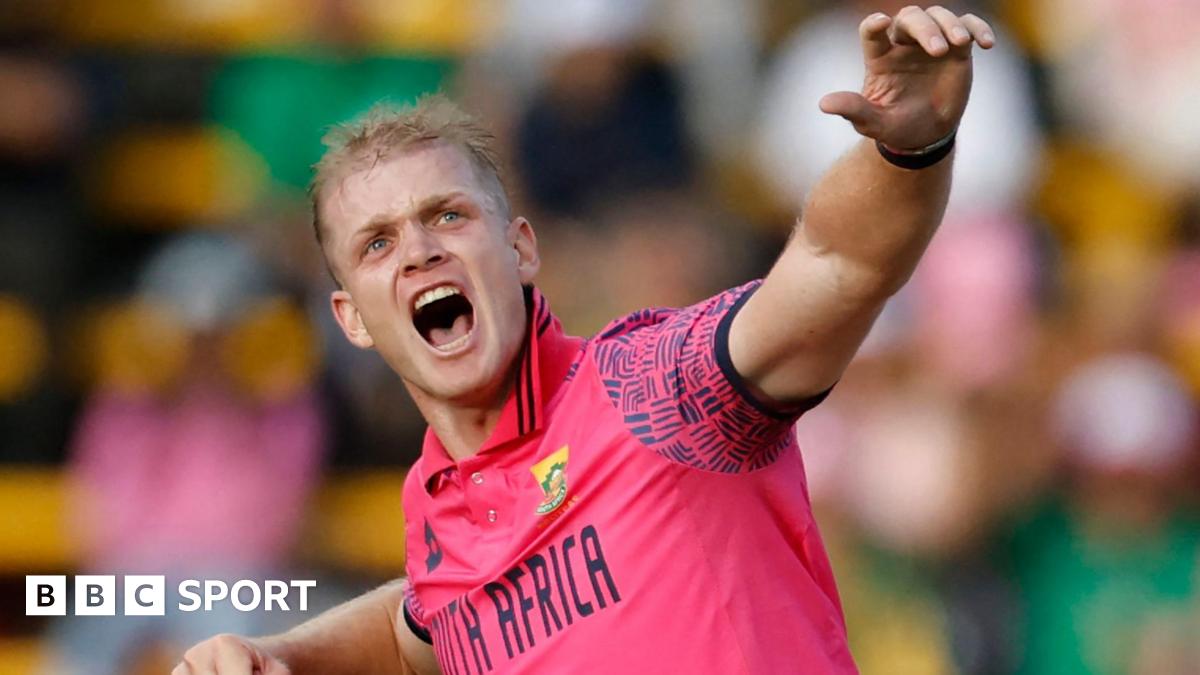Jomel Warrican worships at cricket’s most unfashionable altar – remember the name | Jonathan Liew

There was a lovely moment after the Trinidad Test a couple of years back. With the final day’s play between India and West Indies washed out and the match drawn, Ravindra Jadeja and Jomel Warrican went up to the top of the covered stand to chat spin bowling.
And, you know, really chat about it. The dirty, under-the-counter stuff. Alignment, shoulder positions, approach angles, how to maintain efficiency of momentum into the delivery stride. The stuff that, to those uninitiated in the art and argot of left-arm red-ball spin bowling, might barely even register as English. Just two master craftsmen talking about their arcane, esoteric and very possibly dying craft.
Afterwards, when journalists expressed incredulity that these two opposing players would share trade secrets so openly in the middle of a series, Warrican and Jadeja expressed incredulity at their incredulity. “He had some technical doubts,” Jadeja confided. “If your experience helps someone to get better, there cannot be anything better than that.” Warrican put it even more succinctly: “We all play the same sport.”
But let’s get the elephant out of the room first. Why is this respected British news outlet writing about Warrican in the first place? Why, when Manchester United are a shambles and Ange Postecoglou is on the brink and Novak Djokovic is once again winning friends and influencing people, are you polluting the media ecology with this anti-clickbait about a man who might be described – generously – as the fifth most famous spinner from the West Indies?.
I first came across Warrican’s name, if not his face, when he played for West Indies A against England Lions in an unofficial Test series in early 2018. Man, he looked unplayable on those treacherous Cricinfo scorecards: 31 wickets in three Tests, man of the match in all three. I always tried to track his progress after that, resolved to write something about him whenever he did something worth writing about.
Well, it turned into quite a long wait. For a West Indies team with a clear strength (a battery of good pace bowlers) and a clear weakness (a top order liable to fold like a camping chair) there was a strictly limited utility in a conventional finger spinner who didn’t really bat. While the Lions team he demolished went on to greater things – Sam Curran, Ben Foakes, Liam Livingstone, Haseeb Hameed, Jack Leach, Dom Bess – Warrican did not. Roston Chase and Rahkeem Cornwall got the overs. Warrican, meanwhile, could carry a mean drink. Not until 2021 did he play a Test outside Asia.
But all the while Warrican was working on his talent, honing and adapting. Originally he had wanted to be a fast bowler. Of course he did. Growing up in Murray Village in St Vincent, playing around the back of the timber houses, this was what you were supposed to want. But when he moved to Combermere School in Barbados, following his father who was a professor at the University of the West Indies, the cricket master Roddy Estwick asked him – with a strong sense of what the answer might be – to try a few spinners. So was born a romance.
For years, keeping tabs on Warrican from afar was a thankless task. It’s not like you can just crack open a beer and sit down to watch the West Indies Four-Day Championship. Ditto Denton West in the Greater Manchester League or Walsden in the Lancashire League. And, you know, this really matters. Or, you know, maybe it doesn’t. What we have here, in essence, is a career – a life – dedicated to a craft so specialised, so esoteric, so market-resistant, that it is basically useless, outside its specific context. Like being able to speak Cornish or mend a pipe organ.
This is the art and craft of red-ball spin bowling: how to read a pitch and judge how it might change over a week, how to bowl with close fielders around the bat, how to pile up dot balls so you can set a batter up over several deliveries, several overs, even several hours. How to keep the arm high and the approach angle faithful when the opposition are 500 for four and the heat is brutal. How to toil, how to hold up an end, how to be patient.
Why would anyone do this? What kind of masochist chooses the finely honed art of patience over the repeatable, franchise-friendly skill of bowling 60mph darts into the pitch and selling yourself as a handy middle‑overs option for the Cape Lagoon Swordsmen? Maybe: someone who gets it. Maybe: an incurable romantic. Maybe: someone for whom the years of nothing happening are worth it, for the one sunlit evening when everything happens at once.
after newsletter promotion
There are a few flecks of grey in the beard now. Warrican is 32 years old, a veteran of 18 Tests in more than nine years. But maybe there is just a little of Jadeja’s urging in the way he now approaches the crease, not quicker but straighter and a little more direct, the ball and the hand a momentary blur. West Indies lost, but almost a decade into his Test career Warrican took seven for 32 against Pakistan at the weekend, his first five-wicket haul, as part of his first 10-wicket haul, a bowler who has arrived at last.
In retrospect, it strikes me that there was another dimension to Jadeja’s advice. You see it too in the sight of Jimmy Anderson working with England’s young seam bowlers, Rangana Herath working with New Zealand’s spinners, Neil McKenzie working with Sri Lanka: the wise elders passing on the old ways before they are lost for ever, washed away in the torrent of memory.
Reports suggest the International Cricket Council is discussing a two-tier Test cricket structure, a structure that would guarantee more matches between the big three of England, Australia and India, that would finally parcel off West Indies into the ranks of the part-timers, a kind of sporting vassal whose only real function would be to produce the cricketers who can staff the Indian-run Twenty20 leagues. And while it is easy to deride the greed and cynicism of the vision, it is at least a vision. What is the alternative vision? If we – fans, the media, friendly administrators, taste-makers – are serious about Test cricket as a whole, a cogent entity in which we are all invested rather than a rolling roster of challengers to the Big Three, then we need to start taking all of it seriously. Above all, there is no point in dedicating a life to patience unless we properly celebrate the moments when that patience pays off.
Warrican should be famous for what he did this week. People should be putting his name in lights and telling his story and journalists should be descending on Murray Village wanting to learn his secrets. And not just Warrican but Kamindu Mendis and Sajid Khan and Mominul Haque and Rachin Ravindra and Marco Jansen and many others besides: a galaxy of incredibly dedicated athletes worshipping at the most unfashionable altar of all. Of course, we’re probably not getting to that place any time soon. But consider this my own small contribution.
Related
‘Listen from one ear, ignore from the other’: Former India…
India's Rohit Sharma and Mohammed Shami (AP Photo) NEW DELHI: Former wicketkeeper-batter Syed Kirmani has expressed his opinion that experienced fast bowler Mo
India faces New Zealand in budding rivalry at Champions Trophy…
State AlabamaAlaskaArizonaArkansasCa
ICC and Unilever announce landmark partnership on International Women’s Day…
The two-year partnership, kicking off at this year’s Women’s Cricket World Cup in India and running until the end of 2027, marks the world cricket governing
IPL 2025: Mumbai Indians sign Corbin Bosch as replacement for…
Mumbai Indians have signed South Africa all-rounder Corbin Bosch as a replacement for his injured countryman Lizaad Williams for this year's Indian Premier Leag











